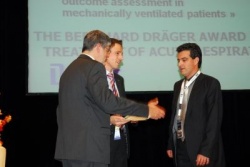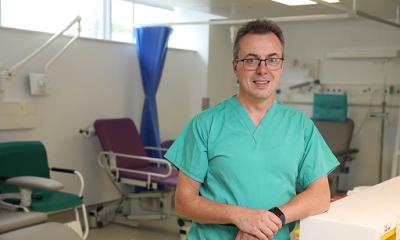The 2009 Bernhard Dräger Award
‘Invention is an act of imagination, the creation of something new’: Bernhard Dräger. The prize that bears his name supports and distinguishes his philosophy
Dr Vasilios Papaioannou, of the Democritus University of Thrace in Alexandroupoli, Greece, received the €15,000 Bernhard Dräger Award for Advanced Treatment of Acute Respiratory Failure during the opening of The European Society for Intensive Care Medicine (ESICM) annual conference in Vienna.

The presentation, made for Dr Papaioannou’s finding on respiratory distress, was made by Professor Rui Moreno, ESICM President, Dr Daniel de Backer, Chairman of the ESICM research committee, and Sebastian Kässner, who heads Dräger’s Respiratory Care division.
Dräger Germany, which sponsors the prize, intends the money to support further studies to advance treatments for acute respiratory insufficiency
In his study Investigation of Cardiorespiratory Coupling, Heart Rate and Breath-to-Breath Variability for Weaning Outcome Assessment in Mechanical Ventilated Patients, Dr Papaioannou evaluated the hypothesis that it is possible to estimate when a patient requires weaning from the ventilator by analysing the parameters of heart rate and breath-to-breath variability. Since the summer of 2009 he has studied at least 30 patients.
‘This study investigates cardiorespiratory variables that are already available, using an innovative approach,’ Daniel de Backer pointed out. ‘It should help to identify reliable indicators to guide the weaning process better, which would be significant for clinical practice.’ The basis of Dr Papaioannou's work is the understanding that heart rate and breath-to-breath variability are subject to a natural variability and that the two factors are connected.
Variability indicates healthy organisms
Studies show that all healthy biological systems are subject to a certain degree of random variability. Possibly, this variability is the cause for higher flexibility and more robust functionality compared with diseased biological systems. As a result, missing heart rate variability is considered as a risk factor for patients with cardiac insufficiency (Buchman TG: The community of the self. Nature 2002; 420: 246-251) and patients successfully weaned from the ventilator show a higher respiratory variability than patients for whom weaning failed (Priori SG et al: Task Force on Sudden Cardiac Death of the European Society of Cardiology. Eur Heart J 2001; 16: 1374-1450. And: Wysocki M et al.: Reduced breathing variability as a predictor of unsuccessful patient separation from mechanical ventilation. Crit Care Med. 2006 Aug; 34).
Swine studies (Gama de Abreu et al. Noisy pressure support ventilation: A pilot study on a new assisted ventilation mode in experimental lung injury. Crit Care Med 2008 Vol. 36, # 3) have shown that an artificially created variability in breathing support results in better oxygenation, among other things. This suggests that ventilators can improve weaning if they have the possibility to ventilate patients with a random variability. The work of the award-winner should supply additional information on this.
Dräger at Medica: Hall 11 Stand J39
17.11.2009











